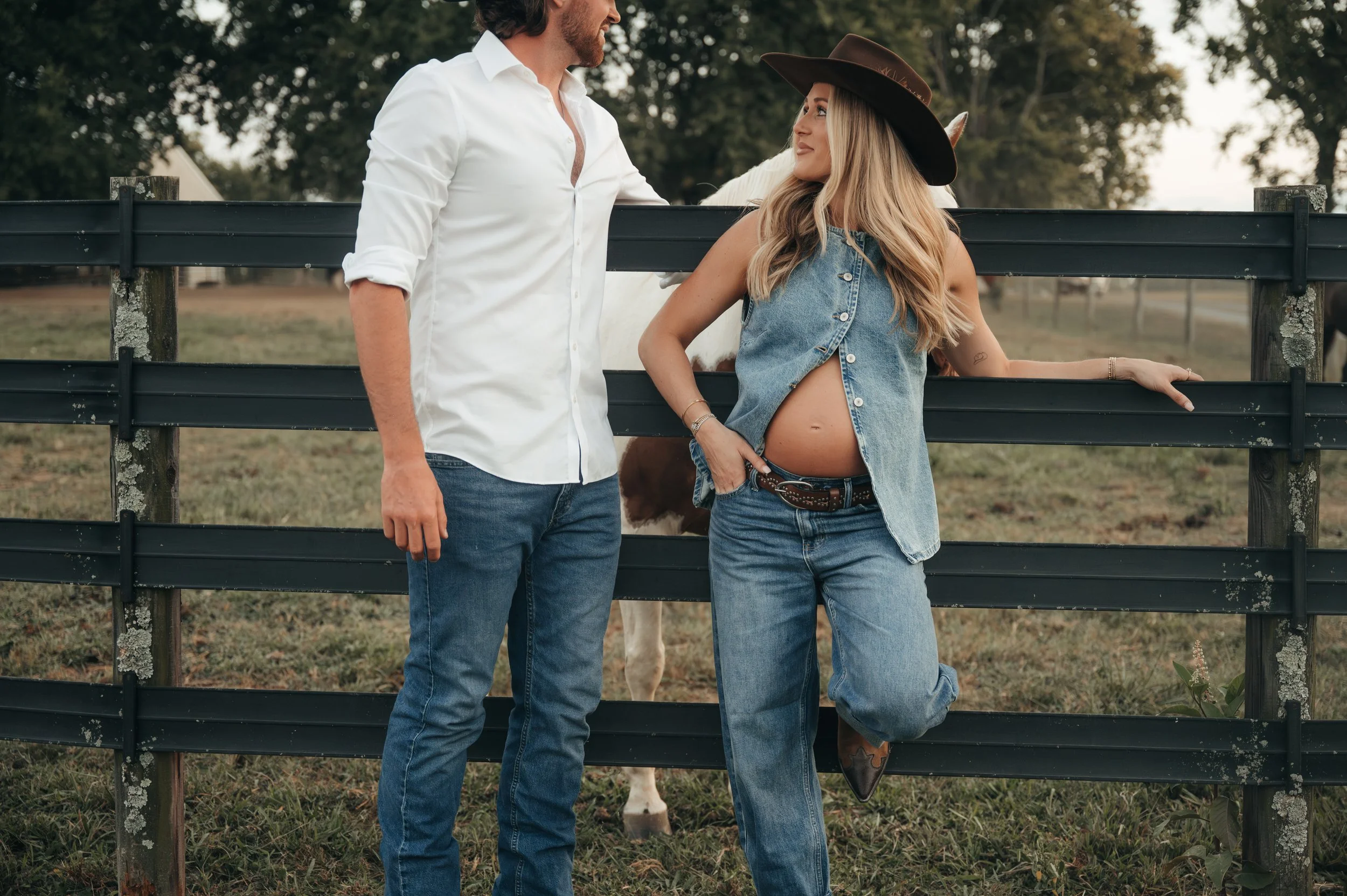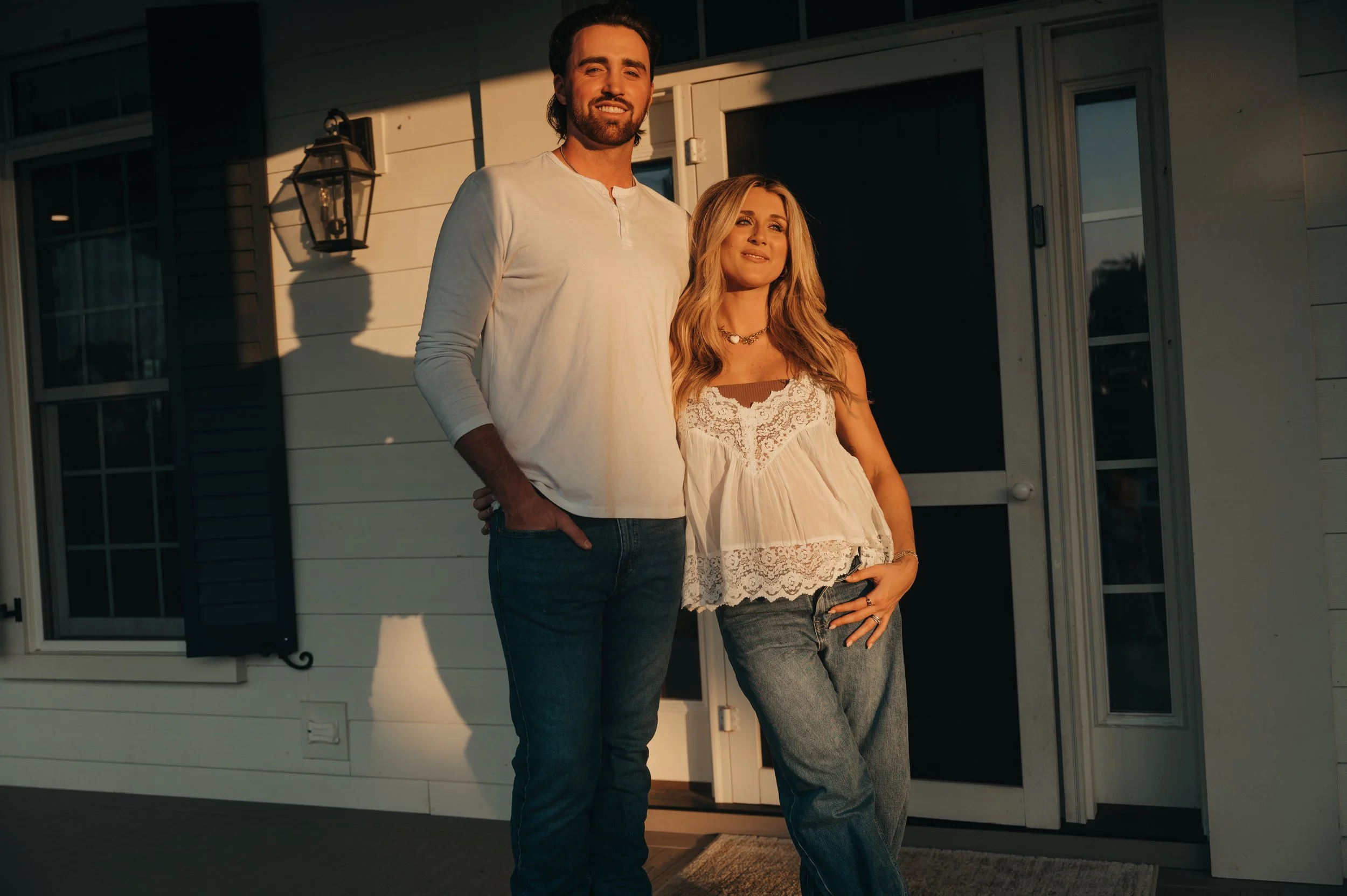The America That Riley Gaines Wants Her Daughter to Inherit
By Bethany Miller
Photography by Bethany Miller
Riley Gaines Barker’s baby is due any day. Nine months ago, the former competitive swimmer probably didn’t think her fight for fairness in women’s sports could become any more salient. But then she learned she was expecting a daughter.
It’s a blue‑sky 70-degree afternoon in the outskirts of Nashville when I pull up to Jubilee Farm, where Riley, and her husband, Louis, are restoring a historic home.
“When that gate closes, I exhale,” Riley, a courageous public critic of transgenderism, says. “It’s my oasis— serenity. I’m safe at home from an increasingly hostile world.”
Her baby will eventually face that world, and Riley will prepare her for it, teaching the same fortitude she’s shown these turbulent three-and-a-half years. But for now, the little one will be tucked away in her parents’ warm embrace.
With all the fearmongering around pregnancy on social media, Riley wanted to put young women curious about motherhood at ease.
“My pregnancy has been a breeze… I’ve felt the exact same as prior to conception— no nausea, no sickness, no fatigue, no aversions. The main side effect is that my pants don’t fit,” she laughs.
Was this planned? “At Christmas we sat down and asked, ‘Do we want to expand our family?’ We decided, if it happens, it happens.” It did— fast. “Baby girl got to go to the inauguration,” OutKick’s “Gaines for Girls” host adds. “I didn’t know she was there at the time, but she watched as President Trump was inaugurated as the 47th president.”
The discovery could have been a sit-com cold open. As a lifelong athlete, her cycle was irregular; a missed period wasn’t news. “I still felt totally normal— no sickness, nothing— so pregnancy wasn’t even on my radar,” she says.
Then, one afternoon, she fainted and woke up with two spectacular black eyes. A stranger online suggested a pregnancy test. “It sounded ridiculous… but I took one. It was positive.” She held the secret for a week, plotting the grand reveal to her husband. Louis had a surprise of his own.
“He came home and said he had good news— his green card was finally coming after years of delays because he wouldn’t get the COVID shot. I said, ‘Well, I have good news, too.’ He thought I was bluffing.” The test on the counter settled it. Shock, laughter, then relief.
“For him it got real as we built the nursery,” she smiles. “Now he’s all in.”
Did she want a girl? “At first I thought I’d be a boy mom,” she admits. “But the minute I found out I was pregnant, it shifted. I wanted a girl, and I knew it was a girl. I would have bet money.” Ten weeks later, the email sealed it: “XX, girl.” Louis’s first words— “I’m going to jail”— were the good kind of vow. “That protective instinct,” Riley says. “If anyone messes with her, he’ll be the one to atone for that.”
In the weeks following Charlie Kirk’s assassination, Riley says she and Louis have watched every video of Charlie and Erika that’s crossed their timeline. What stood out immediately was the way their love for Christ and for one another was impossible to miss. Erika spoke with passion and grace, embodying femininity alongside devotion to her calling as wife, mother, and believer. Charlie’s demeanor toward her was unlike anything Riley had seen him show to anyone else— his words slowed, his tone softened, his entire presence marked by a man intent on serving his wife. It was clear, Riley says, that he would have moved heaven and earth for her. It was a rightly ordered love.
“Their example has sparked some of the most meaningful conversations in our own marriage about our spiritual growth as individuals and as a couple, about politics and values, and about the kind of legacy we want to build for our daughter,” Riley says.
The nursery theme nods to Riley’s Southern upbringing: “I’ve been obsessed with the geese. The baby‑shower theme was goslings and gingham. Not too girly, but really cute.”
Her love story with Louis reads like a classic campus rom‑com with God’s timing written all over it. A Kentucky basketball offer convinced Riley to visit a school she hadn’t planned on considering. “I stepped on campus and fell in love with the place,” she recalls. “I called dibs on the British one the first week.” They dated throughout college; he graduated in three years, then COVID grounded him from returning to England and he moved to Nashville with her family. She’d warned him not to propose— “I was headed to dental school in Memphis, he was building a business in Nashville”— but the day after nationals, he dropped to one knee.
“Before he even hit the ground, he was in tears,” she says. “I looked around thinking, this is fake. Of course I said yes.” Two months later, they married. “Getting married young has been the biggest blessing,” Riley says. “Three years of just us two— and now we get to grow our family. He challenges me intellectually, plays devil’s advocate, and makes me think. He’s my calm.”
Growing up, Riley was the typical Bible-belt girl who attended church three times a week during her formative years. But as a freshman in college, she often hit the snooze button on Sundays— until the faith called her back.
“Louis comes from England, where roughly five percent go to church,” she says. “I told him it mattered to me, and it felt wrong to say that if I wasn’t living it— so we made a vow: let’s go to church together.”
“Before anything, I want to live a Christlike life,” she says. “This fight is rooted in biblical truth. ‘Male and female’ is not a throwaway line— it’s Genesis.”
When The New York Times ran a profile on Riley last month, the messages turned cruel. “People said horrific things— about me, about my daughter. But I can and must keep marching on with a smile because nothing of this world ultimately matters. I’m fighting for the hope and promise of eternal life.”
The steadiness in her faith, she says, comes from her familial anchors and personal discipline.
“I try not to compromise on time in the Word and prayer. To know Jesus is to love Him; to love Him is to obey Him. When you obey Him, He reveals Himself to you.”
Conceiving a child has deepened Riley’s convictions on many fronts. Her pro-life position is now tangibly true, forming in her womb.
“Hearing the heartbeat at eight weeks, then the anatomy scan at twenty— the tiny hands and feet, the flips at two in the morning— you can’t unsee a person,” she says. “There’s nothing I wouldn’t do to protect her.”
It spoke volumes that Riley chose Turning Point USA’s Young Women Leadership Summit as the venue to break the news that she was pregnant. She wittily unveiled a sonogram in an announcement that had the crowd of young women immediately on their feet.
Riley recognized then how deeply Charlie Kirk’s organization shaped the youth political consciousness. Now stewarded by Erika Kirk following Charlie’s shocking assassination, TPUSA is on another mission: to change the hearts of young women. Riley will no doubt be instrumental in that.
And a big part of Riley’s advocacy will be continuing to call a spade a spade and demand better for women, especially from those in high places.
“When I got the notification that Simone Biles had tagged me, I was over the moon,” Riley says. “I admire her.”
But rather than common sense, the former Olympian had chosen a war of words on X.
“The tweet read: ‘bully someone your own size, which, Biles suggested, ‘would ironically be a man.’”
Riley was six months pregnant.
“It bewildered me that another woman could say that as I’m growing a human.”
At the women’s TPUSA conference, Riley said, “Simone says I look like a man— but how many men can do this?”as the sonogram unfolds to hundreds of cheering young women.
“Louis revealed we were having a girl. They shrieked.”
After intense backlash, Biles later apologized for the personal jab and hinted that she did not want to compromise fairness in women’s sports. Though Riley invited Biles to link arms with her in the fight, nothing else has come of that overture.
“Very few elite athletes will wade in publicly,” Riley says, though plenty support her privately.
Riley believes that Gen Z women, though they are the most progressive group in history, could still have a conservative epiphany.
“People write them off because they don’t donate and they’ve trended left— but I don’t see a lost cause,” she says. “I see girls who are empathetic and emotionally driven— fantastic friends and sisters— but timid about saying what they know is true.”
Her counsel is kitchen‑table plain: “Understand you have a circle of influence. You don’t need a platform. Say one true sentence in your team meeting, classroom, small group, or on Instagram. Courage is contagious.”
And while Gen Z women are firmly in the Democratic camp, a significant percentage switched over to Donald Trump in the November election.
“We saw how those numbers shifted— and how they turned out for Trump in November of last year,” Riley says.
“We’ve won battles, but the war isn’t over,” she cautions. “People think because Trump is back the war on woke is won— don’t get comfortable.”
Political victories are one thing; the broader culture can be much more stubborn. Vigilance is needed, she says. Many say they are hesitant to bring a child into such a dark world. Riley counters that sentiment.
“I think this next generation is going to save America,” she answers. “The other side isn’t having kids— they’re sterilizing themselves or in relationships where conception won’t happen. Strong households with nuclear families are reproducing. That’s how you shift the culture— by having kids and instilling values.”
“We will out-baby them,” she says tongue-in-cheek.
Motherhood has also re‑aimed her activism. “Three years ago I spoke as someone who was personally impacted,” she says. “Now I’m fighting for my sixteen‑year‑old sister, for the girls I meet on campus. That alone shifts your perspective.”
She has no plans to slow down. “One hundred percent we can do both,” Riley says. “Yes, there’s value in the traditional life, but it’s not realistic for every woman. A lot of families rely on two incomes. So I plan to keep showing up— on campuses, at statehouses. Twenty‑eight states have passed fairness in women’s sports. Eighteen have defined ‘woman’ in law. Texas is moving to protect women’s privacy. This fall the Supreme Court will hear Title IX oral arguments, and I plan to be right outside with baby girl in tow— because it’s her future we’re fighting for.”
“Finish the sentence for me,” I say, “The America I want my daughter to inherit is…”
“A fair one,” Riley replies. “Not the bureaucratic knock‑off of equity— the real promise that effort means opportunity. If she works hard, she should succeed. If she puts her mind to something, she can do it.”
She tucks the ultrasound back into its envelope and we wrap up the tour of the Barkers’ home.
“I’m just excited,” she adds. “Motherhood will be the most fulfilling chapter of our lives yet. It’s my purpose. It’s my greatest calling.”
“Baby in tow— we’ll save America.”
Bethany Miller is Managing Editor of The Conservateur. A South Asian American writer, her reporting delivers classy conservative commentary on the conversations of our time. You can find her on Instagram and X @bethanyymmiller.
















